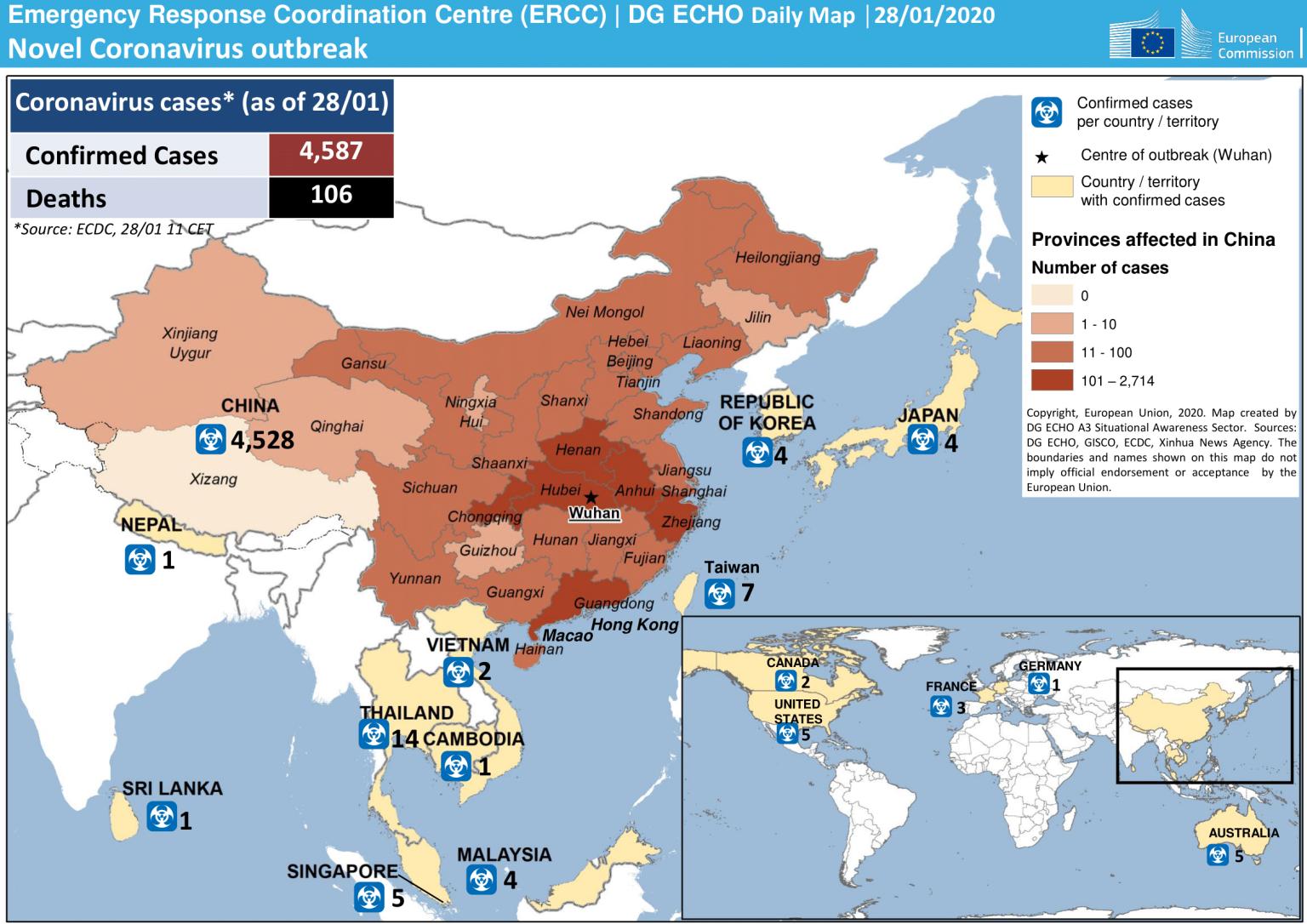As the outbreak of the novel COVID-19 (Coronavirus) intensifies, the EU Civil Protection Mechanism has been activated following a request for assistance from France to provide consular support to EU citizens in Wuhan, China.
Background.
The EU Civil Protection Mechanism strengthens cooperation between Member States/Participating States in the field of civil protection, with a view to improving prevention, preparedness and response to disasters. Through the Mechanism, the European Commission plays a key role in coordinating the response to disasters in Europe and beyond.
When the scale of an emergency overwhelms the response capabilities of a country, it can request assistance via the Mechanism. Once activated, the Mechanism coordinates assistance made available by its Member States/Participating States through spontaneous offers. In addition, the EU has created the European Civil Protection Pool to have a critical number of readily available civil protection capacities allowing for a stronger and coherent collective response.
To date, all EU Member States participate in the Mechanism, as well as Iceland, Norway, Serbia, North Macedonia, Montenegro, and Turkey. Since its inception in 2001, the EU Civil Protection Mechanism has responded to more than 300 requests for assistance inside and outside the EU.
The EU Civil Protection Mechanism strengthens cooperation between Member States/Participating States in the field of civil protection, with a view to improving prevention, preparedness and response to disasters. Through the Mechanism, the European Commission plays a key role in coordinating the response to disasters in Europe and beyond.
When the scale of an emergency overwhelms the response capabilities of a country, it can request assistance via the Mechanism. Once activated, the Mechanism coordinates assistance made available by its Member States/Participating States through spontaneous offers. In addition, the EU has created the European Civil Protection Pool to have a critical number of readily available civil protection capacities allowing for a stronger and coherent collective response.
To date, all EU Member States participate in the Mechanism, as well as Iceland, Norway, Serbia, North Macedonia, Montenegro, and Turkey. Since its inception in 2001, the EU Civil Protection Mechanism has responded to more than 300 requests for assistance inside and outside the EU.

Director of the Chinese Center for Disease Control and Prevention Gao Fu speaks during a State Council Information Office press conference in Beijing, 26 January 2020. Source: Noel Celis Getty Images
EU Civil Protection Mechanism activated for the repatriation of EU citizens.
The EU will co-finance the transport costs of the aircraft. The first aircraft is scheduled to depart from France tomorrow morning, while the second one will leave later in the week. EU citizens present in the region and who wish to be repatriated can still request it, no matter their nationality.
Initial numbers indicate that around 250 French citizens will be transported in the first aircraft and over 100 EU citizens from other countries will join the second aircraft. This is a first request for assistance and others may follow in the coming days.
At this stage, only healthy or asymptomatic citizens will be authorised to travel. The EU Emergency Response Centre is in constant contact with Member States' governments in order to coordinate the arrivals and subsequent possible quarantine periods.
The European Commission is in regular contact with Member States, the European Centre for Disease Prevention and Control and the World Health Organisation on all aspects of the COVID-19 (Coronavirus) outbreak.
- For further scientific information, kindly check: "The Coronavirus Questions that Scientists are Racing to Answer", Scientific American, Helen Branswell, STAT, 28 January 2020.
Updated on 12.02.2020
The EU will co-finance the transport costs of the aircraft. The first aircraft is scheduled to depart from France tomorrow morning, while the second one will leave later in the week. EU citizens present in the region and who wish to be repatriated can still request it, no matter their nationality.
Initial numbers indicate that around 250 French citizens will be transported in the first aircraft and over 100 EU citizens from other countries will join the second aircraft. This is a first request for assistance and others may follow in the coming days.
At this stage, only healthy or asymptomatic citizens will be authorised to travel. The EU Emergency Response Centre is in constant contact with Member States' governments in order to coordinate the arrivals and subsequent possible quarantine periods.
The European Commission is in regular contact with Member States, the European Centre for Disease Prevention and Control and the World Health Organisation on all aspects of the COVID-19 (Coronavirus) outbreak.
- For further scientific information, kindly check: "The Coronavirus Questions that Scientists are Racing to Answer", Scientific American, Helen Branswell, STAT, 28 January 2020.
Updated on 12.02.2020
Posted by Ch. Óscar de Andrés, on Wednesday, January 29th 2020 at 14:05
|
Comments (0)
Category
Recent posts
Archives
#Team Management #Gestión de Equipo International Business Development #Gestión de Equipo Comercial
5 MISSION AREAS IN HORIZON EUROPE
Acceso universal al tratamiento del sida
ACNUR
actor Pepe Sancho
ADHESIÓN DE CROACIA A LA UE
advertising / teleshopping spots
Africa
Alianza Atlántica
Alianza del Pacífico
Alibaba
Alibaba Group Holding Ltd.
AlipayApp
Amnistía Internacional
Ana Pastor
AnálisisyGestiónInteligenteDeDatos
Angela Merkel
Banco Central Europeo (BCE)
Banco Mundial
Barack Obama
batalla del sector del taxi y VTC
Benjamin Franklin
Bill Gates
binomio chavismo / antichavismo
Blockchain opportunities in international public health care sector
Blockchain technologies in health care
Blog Posts
Boris Johnson
Brexit
BUILDING THE CITIES OF THE FUTURE
China
Comisión Europea
Coronavirus
Covid-19
COVID-19
Cybercrime
David Cameron
Editorial Universitas SA
EU Convention of Human Rights
European Commission
FMI
Henrique Capriles
Human Rights
ICAA
International Business Development
Jack Ma
Jean-Claude Juncker
Mariano Rajoy
Obama
ONU
OSCE
The Council of Europe
Thomas Hammarberg
UNED
UNHCR
Unión Europea
Vladímir Putin







